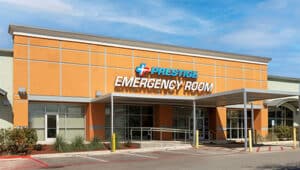A blood sugar imbalance can quickly become a medical emergency, especially if you have diabetes, liver disease, kidney disease, or adrenal insufficiency.
Recognizing the warning signs of high or low blood sugar early can help you act fast and get the care you need.
If symptoms become severe, go directly to Prestige ER. We are here 24 hours a day, seven days a week, ready to provide expert, personalized emergency care.
Understanding High vs. Low Blood Sugar
What Is High Blood Sugar (Hyperglycemia)?
Hyperglycemia occurs when blood glucose levels are abnormally high.
What Is Low Blood Sugar (Hypoglycemia)?
Hypoglycemia occurs when blood glucose levels are abnormally low.
Key Differences Between Hyperglycemia and Hypoglycemia
Hyperglycemia and hypoglycemia may sound similar, but these conditions are vastly different.
Hyperglycemia can be caused by a lack of physical activity, stress, certain medications, pancreatic disease, insulin resistance, or diabetes.
Hypoglycemia can be caused by certain medical conditions (e.g., liver disease, kidney disease, adrenal insufficiency), alcohol consumption, intense or prolonged physical activity, inadequate food and carbohydrate intake, and excessive insulin.
Symptoms of High and Low Blood Sugar
High blood sugar symptoms
- Extreme thirst.
- Dry mouth.
- Weakness.
- Fatigue.
- Frequent urination.
- Blurry vision.
- Confusion.
- Nausea.
- Shortness of breath.
Low blood sugar symptoms
- Hunger.
- Irritability.
- Difficulty concentrating.
- Fatigue.
- Sweating.
- Confusion.
- Rapid heartbeat.
- Shaking.
- Headache.
When to Go to the ER for Blood Sugar Issues
High Blood Sugar – ER Visit Triggers
Go to your nearest Prestige ER location if you have high blood sugar (hyperglycemia) along with warning signs like persistent vomiting, severe dehydration, confusion, fruity breath, confusion, or excessive weakness.
Hyperglycemia is a medical emergency that requires prompt treatment. It can significantly increase your risk of heart disease, chest pain, heart attacks, and strokes.
Low Blood Sugar – ER Visit Triggers
Go to your nearest Prestige ER location if you have low blood sugar (hypoglycemia) along with warning signs like confusion, loss of consciousness, seizures, or an inability to swallow.
ER Treatment for Blood Sugar Emergencies
High Blood Sugar ER Treatment Options
If you visit the ER with high blood sugar, treatments typically include:
- Rehydration and fluid replacement.
- Electrolyte rebalancing.
- Insulin therapy.
- Monitoring.
Low Blood Sugar ER Treatment Options
If you visit the ER with low blood sugar, treatments may include:
- Fast-acting source of sugar (e.g., glucose tablets, fruit juice, honey, or syrup).
- Glucagon injection or nasal spray.
- Intravenous glucagon for severe cases.
- Monitoring.
Managing Blood Sugar to Avoid ER Visits
Preventative Measures for Hyperglycemia
To prevent hyperglycemia, the most important thing you can do is focus on maintaining a healthy lifestyle. Depending on your overall health, this may include one or more of the following:
- Eat a well-balanced diet.
- Exercise daily.
- Maintain a healthy weight.
- Monitor your blood sugar levels (especially if you have diabetes or are on insulin).
- Follow all doctor instructions for medication and treatment.
Preventative Measures for Hypoglycemia
To prevent hypoglycemia, monitoring your blood sugar levels and maintaining consistent mealtimes and portion sizes is essential. Additional prevention tips include:
- Eat every four to five hours.
- Keep snacks readily available, especially at night.
- Monitor and track your blood sugar levels as directed by your doctor.
- Watch for signs of low blood sugar (e.g., shakiness, sweating, confusion, or dizziness).
- Follow all doctor instructions for medication and treatment.
When to Seek Medical Advice Before an ER Visit
If you have diabetes or think you might consult your primary care doctor for guidance. Mild cases of hyperglycemia and hypoglycemia may be managed at home by balancing electrolytes or adjusting sugar intake.
However, if you experience severe symptoms such as confusion, severe weakness, or loss of consciousness, seek immediate care at Prestige ER.
We provide expert emergency services for hyperglycemia, hypoglycemia, and its more severe complication, diabetic ketoacidosis.
As a veteran-owned ER, we’re proud to serve the San Antonio community with personalized, compassionate care—365 days a year, 24 hours a day.
Find a location and visit us today.












